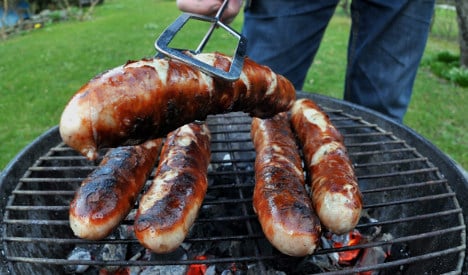Police reported on Saturday that officers had called an end to a grillside gathering of around 50 “openly right-leaning people” in Ebersburg near Fulda, Hesse.
A police spokesman told The Local that someone from the group had rented out the space, saying they were going to celebrate there, but hid the group’s political leanings.
Officers then noticed that the group had banners with such statements as “Kaiserreich” (German Empire) and paratrooper-style jump boots – typical apparel of far-right scene members.
“It was clear that they only had political purposes in meeting,” the spokesman said.
“If officials had known the political reasons, they would not have allowed them to rent the space.”
After consulting with local authorities who said the gathering should not be permitted, “strong police forces” then arrived to put an end to the event.
Police said that the group was cooperative and left without any confrontations or need for arrests.
The spokesman explained that local officials have the final say in who is allowed to rent out such spaces, so long as they do not discriminate against certain protected minority groups.
But journalists at the right-wing newspaper Junge Freiheit criticized the police action on social media.
Editor Felix Krautkrämer took issue on Twitter with how the police report stated that the group had “withheld their views” when they booked the grilling space.
“Notice: if someone is 'right-leaning', that must always be honestly specified when renting a grill space,” he writes.
Merke: Wenn man “rechtsgesinnt” ist, das beim Grillplatz-Anmieten auch immer brav angeben… Via @GefrKamnitzer pic.twitter.com/x6adJCJnVy
— Felix Krautkrämer (@krk979) August 14, 2016
“Always crazier: disclose your views when you rent a grill space, and if you're to the right, forget about it,” wrote another journalist from the same newspaper.
Immer irrer: Geben Sie beim Grillplatz-Mieten Ihre Gesinnung an, und wenn es eine rechte ist, vergessen Sie's. https://t.co/KgnkVpDQ0Z
— Lukas Steinwandter (@LSteinwandter) August 15, 2016
“They rented a grill space and then grilled? Luckily the grilling was stopped,” wrote another user, whose profile picture was of a shirt reading “fight for your country” in Latin.
@krk979 @patriarchator Die haben einen Grillplatz gemietet und dann gegrillt? Zum Glück wurde die Grillerei gestoppt.
— Meike (@Meike_1683) August 15, 2016
“It's pretty amazing how political views are becoming a criterium that justifies anything,” wrote another.
Schon erstaunlich, wie immer mehr die politische #Gesinnung Kriterium für alles mögliche wird..#Fulda … https://t.co/ForODZzcAk#diktatur
— Mitsch Corvus (@mitsch73) August 15, 2016




 Please whitelist us to continue reading.
Please whitelist us to continue reading.